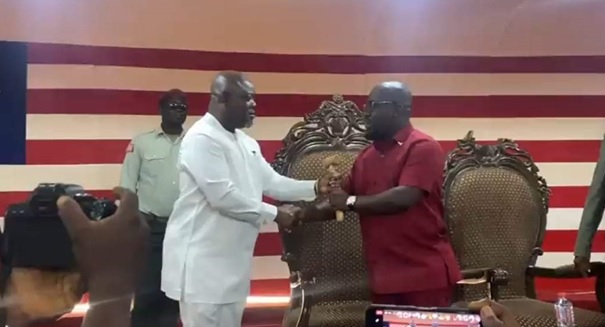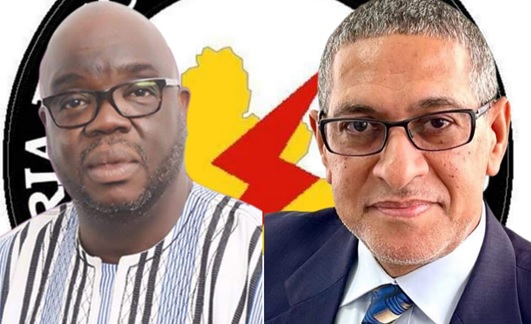MONROVIA, LIBERIA – In a major shake-up on Capitol Hill, Deputy Speaker Thomas Fallah has officially joined the growing opposition to Speaker J. Fonati Koffa, presiding over Thursday’s session that pushes for accountability in the leadership of the House of Representatives. This development follows rising tensions in Liberia’s legislature, with Speaker Koffa facing increasing demands to resign amid accusations of budget manipulation, obstructing an audit by the General Auditing Commission (GAC), and spreading misinformation.
On October 29, 2024, Acting Chief Clerk James S. Tuobie, Jr. sent a letter to Fallah in response to his previous communication, which requested additional time to consult with his legal team. Fallah sought this to ensure his decision would align with the Liberian Constitution and other relevant statutes. The letter acknowledged his request but affirmed plenary’s directive for him to preside over the 6th Day Sitting on October 31. “Dear Hon. Deputy Speaker,” the letter opened, “by directive of plenary (IN SESSION), I am to inform you that plenary has acknowledged receipt of your communication… and hereby requests that you appear before its 6th Day Sitting Session on Thursday, October 31, 2024, to discharge your Legislative duty in the Joint Chambers.”
Deputy Speaker Fallah, in a formal statement before aligning with the anti-Koffa bloc, emphasized that his decision was grounded in democratic principles rather than party division. “Therefore, I have decided to join my colleagues who have raised some grievances against Speaker Koffa, for which this Honorable body is being brought to disrepute,” Fallah stated. Stressing his commitment to democracy, he added, “My decision to join the call for resolving this deadlock is not a repudiation of my support for Speaker Koffa or the CDC. It is instead a demonstration of my unwavering commitment to our democracy, which must transcend any one individual or faction.”
The accusations against Speaker Koffa are serious, with fellow lawmakers alleging he manipulated budget allocations, obstructed the GAC’s auditing process, and provided misleading information, actions they claim have compromised the integrity of Liberia’s House of Representatives. Fallah’s decision to support the opposition strengthens the call for Koffa’s resignation and highlights the growing divide within the former ruling Coalition for Democratic Change (CDC), as both leaders belong to the same party.
Political commentator and journalist Togar Alexander Bealded weighed in on the situation today, pointing to the inevitable role of numbers in legislative politics. “Legislative politics has and will always be a numbers game,” Bealded remarked. Citing Article 33 of the Liberian Constitution, he noted that while 49 members are required to remove a Speaker, a simple majority of 37 is sufficient to conduct legislative business, giving the anti-Koffa bloc ample authority. “So to have 44 is enough to say, ‘Hon. Speaker, it’s time to bow out,’” Bealded observed.
Bealded further argued that Fallah’s choice to join the opposition bloc was a practical move to protect his own position within the House. He explained that Fallah, as Deputy Speaker, faced the risk of removal himself if he were to remain aligned with Koffa. “Fallah has done what is legislatively prudent to save his job rather than risk having both CDCians at the top of the HoR removed,” he noted, adding that it is preferable for the party to retain at least one leadership position in the House.
Drawing comparisons with international legislative norms, Bealded cited examples from countries like the United States and the United Kingdom, where parliamentary leaders often step down when they lose the confidence of their members. He argued that Koffa should follow this precedent. “You don’t wait for a constitutional number when you’ve lost it,” Bealded stated emphatically. “Throw in the towel.”
The anti-Koffa movement continues to gather momentum, with lawmakers from across the aisle voicing concerns over the Speaker’s leadership. The ongoing rift within the CDC, with Fallah now at the forefront, signals that Koffa’s future as Speaker may be in jeopardy. As Fallah presides over the session on October 31, the House is expected to address these grievances in what could be a decisive moment for Koffa’s tenure.
For now, Deputy Speaker Fallah’s alliance with the anti-Koffa bloc underscores his stance on accountability and integrity in public office. The outcome of this internal legislative battle could have far-reaching implications for the CDC and the overall direction of Liberia’s House of Representatives, particularly as the nation faces heightened expectations for transparency and effective governance. The question remains whether Koffa will heed the calls for resignation or if he will continue to defend his leadership amid mounting criticism.







